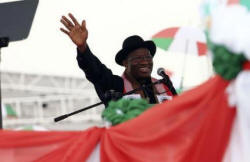|
 Nigeria
opposition meets to pick candidate against Jonathan Nigeria
opposition meets to pick candidate against Jonathan
 Send a link to a friend
Send a link to a friend
[December 10, 2014]
LAGOS (Reuters) - Nigeria's main
opposition coalition began a convention on Wednesday to select a
candidate to take on President Goodluck Jonathan in February, in what
will be the most closely fought election since the end of military rule
in 1999.
|
|
 Two political heavyweights led the race for the opposition All
Progressives Congress (APC) ticket: former military ruler Muhammadu
Buhari and ex-vice president Atiku Abubakar, both Muslims from the
country's north. Two political heavyweights led the race for the opposition All
Progressives Congress (APC) ticket: former military ruler Muhammadu
Buhari and ex-vice president Atiku Abubakar, both Muslims from the
country's north.
Three other candidates have put their names forward to challenge
Jonathan, a southern Christian, who has come under fire for his
handling of the economy and a mounting insurgency by Boko Haram
Islamist militants.
Eight thousand delegates began gathering in Nigeria's national
stadium in the commercial capital Lagos, to vote for their choice.
Results are expected on Thursday.
Lagos traffic, bad at any time, ground to a standstill.

The ruling People's Democratic Party (PDP) holds its primary on
Thursday -- a formality since Jonathan has already been approved by
its board as sole candidate.
The polls in February 14 will test whether Africa's biggest economy
and top oil producer can learn from past mistakes that have often
seen elections marred by fraud and violence.
They occur against a backdrop of a plunge in fiscal revenues and a
currency devaluation triggered by falling oil prices.
The likely contest between an opposition candidate from the largely
Muslim north and an incumbent from the mostly Christian south sets
up a regional and sectarian divide that could be a flashpoint for
trouble.
Jonathan's bid for a second elected term has upset northern elites
who argue he broken an unwritten deal that power rotate between
north and south every two terms. He ran in 2011, after replacing
northerner Umaru Yar'Adua, who died during his first term in 2009.
[to top of second column] |

Northern anger has also been fueled by growing perceptions of shift
in power toward the more prosperous south. More than 800 people were
killed and 65,000 displaced in three days of rioting in the north
after Jonathan's 2011 win against Buhari.
Buhari has huge grassroots support and is seen as one of the few
leaders in the country's history who was tough on corruption after
he seized power in a 1983 coup -- he was deposed himself less than
two years later.
Abubakar has largely campaigned on the achievements of his
government under ex-president Olusegun Obasanjo, which include
getting Nigeria's debt written off and creating Economic and
Financial Crimes Commission (EFCC) to fight graft and fraud.
(Reporting by Tim Cocks; Editing by Andrew Heavens)
[© 2014 Thomson Reuters. All rights
reserved.] Copyright 2014 Reuters. All rights reserved. This material may not be published,
broadcast, rewritten or redistributed.
 |